15 Natural Remedies For Intestinal Parasites & Prevention Tips
While the condition may sound scary, its remedies are often simple and easily available.

Image: Shutterstock
If you are experiencing a lot of stomach aches accompanied by nausea, weakness, and loose stools, chances are you have intestinal parasites. Fortunately, there are a few natural remedies that can help you get rid of intestinal parasites. To know more about the causes, symptoms, and natural remedies, scroll down to keep reading.
In This Article
What Are Intestinal Parasites?
Intestinal parasites or worms are organisms that feed off of other organisms, like humans or animals.
The most common types of intestinal worms are flatworms and roundworms.
Flatworms include tapeworms and flukes, while roundworms cause ascariasisi A kind of roundworm infection that occurs due to the intake of food contaminated with roundworm eggs. , pinworm, and hookworm infections.
- Tapeworm: Tapeworms are white, often growing to be multiple meters in length, and can live in humans for decades.
- Flukes: Fluke is a type of flatworm.
- Hookworms: These worms are spread through feces and infected soil.
- Pinworms (Threadworms): These are tiny worms that occur mostly in children.
- Trichinosis Worms: Trichinosis worms are roundworms that are often passed through animals. Consuming undercooked meat that may contain the larvae of these worms is one of the most common ways of getting infected.
 Did You Know?
Did You Know?Intestinal parasite infections may be quite hard to detect, and you may not even know if you are harboring these worms. Although most of the times, there are no symptoms, infected individuals may develop mild symptoms like the ones given below.
Key Takeaways
- Intestinal parasites cause loss of appetite, nausea, fever, and headaches.
- The antimicrobial properties of tea tree oil fight parasites attached to your intestinal walls if topically applied on your belly or anus.
- Gingerol in ginger improves digestion and eliminates intestinal parasites.
- To prevent intestinal parasites, wash your hands thoroughly before and after meals and avoid eating raw fish or meat.

Signs And Symptoms of Human Intestinal Parasites
- Loss of appetite
- Stomach ache
- Nausea
- Weakness
- Fatigue
- Weight loss
- Anemiai A condition in which the blood doesn’t have enough healthy red blood cells to carry adequate oxygen to your body tissues.
A tapeworm infestation is likely to cause:
- Bumps
- Allergic reactions
- Fever
- Seizures
Flukes are likely to cause fever and fatigue.
Symptoms associated with hookworm infections include:
- Fatigue
- Itching skin
- Rashes
Pinworms may cause itchiness in or around the anal area. You may also notice these tiny worms in your feces if you are infected. Thankfully, there are many home remedies that treat pinworms.
Trichinosis worms can travel through your bloodstream and enter your tissues, thereby causing:
- Swelling of your face
- Fever
- Muscle tenderness
- Sensitivity to light
- Headaches
The doctor may perform various tests to detect intestinal parasites. Keep reading to understand what to expect during the examination.
Diagnosis Of Human Intestinal Parasites
When you visit your doctor, they will ask about your recent travel history and dietary habits. This is not just a routine set of questions, but a crucial part of the diagnostic process. Certain parasites are more prevalent in specific regions, and your dietary habits and exposure to contaminated water or soil can provide valuable clues.
They may also carry out certain laboratory tests, which may include:
- Stool examination, where a sample is examined under a microscope to identify eggs, larvae, or adult parasites.
- Blood tests to detect antibodies to certain parasites or to measure levels of inflammation.
In some cases, additional tests may be necessary, such as imaging studies (e.g., X-rays, CT scans, MRI) or endoscopy.
You may get infected by intestinal parasites in different ways. Some common risk factors and causes of developing human intestinal parasites are listed below.
Causes And Risk Factors Of Human Intestinal Parasites
You can become infected by human intestinal parasites by:
- Consuming undercooked meat
- Drinking contaminated water
- Coming in contact with contaminated soil, water, feces or some household utensils
- Poor hygiene and sanitation
Certain factors can increase your risk of getting infected with parasites. They are:
- Age: Children and older adults are more susceptible to parasitic infections because of weak immunity
- Living in areas with poor hygiene
You may become infected with intestinal parasites in the blink of an eye, in the most unpredictable way.
However, sooner or later, symptoms will surface. If you have developed intestinal parasites, the following remedies can help in cleansing your intestines and getting rid of the parasites naturally and effectively.
Home Remedies To Treat Intestinal Parasites
1. Tea Tree Oil
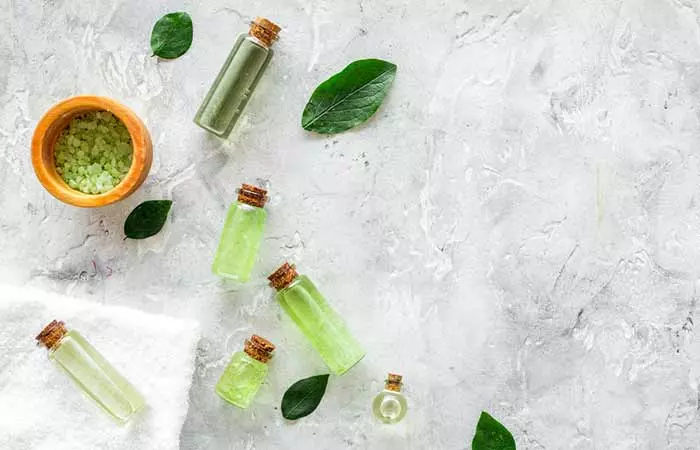
You Will Need
- 12 drops of tea tree oil
- 30 mL of coconut oil
What You Have To Do
- Mix 12 drops of tea tree oil with 30 mL of coconut oil.
- Massage the blend gently into your belly for a few minutes.
- You may also apply this mixture directly to your anus.
- Leave it on overnight.
How Often You Should Do This
You must do this once daily.
Why This Works
Tea tree oil is quite popular for its antimicrobial properties. One of its lesser-known ability is its potential to fight parasites. Applying the oil can help remove the parasites attached to your intestinal walls and expel them (2).
2. Garlic
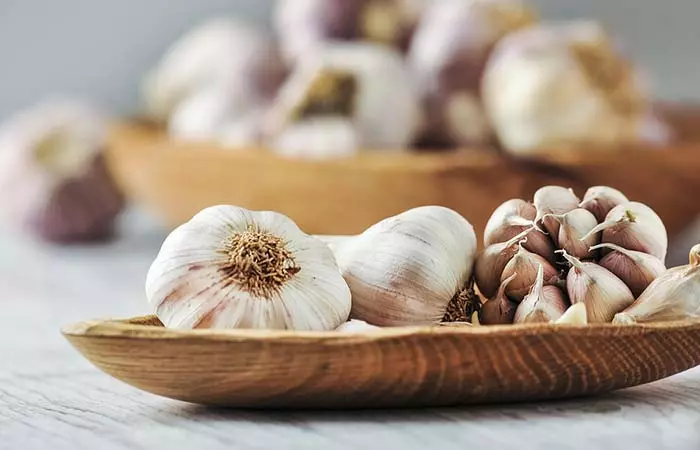
You Will Need
2-3 cloves of peeled garlic
What You Have To Do
Chew on two to three cloves of peeled garlic and consume daily on an empty stomach. If you have a sensitive throat, try baking the garlic with it coated in coconut oil. Consume 6 gloves a day, instead of 2-3, as it becomes less potent against parasites with baking.
How Often You Should Do This
Do this every morning.
Why This Works
The presence of compounds like allicin and ajoene in garlic impart anthelmintici A broad range of drugs or substances designed to act against infections caused by parasitic worms. properties to it.
Thus, eating raw garlic daily can help in killing stomach worms quite easily (3).
3. Castor Oil
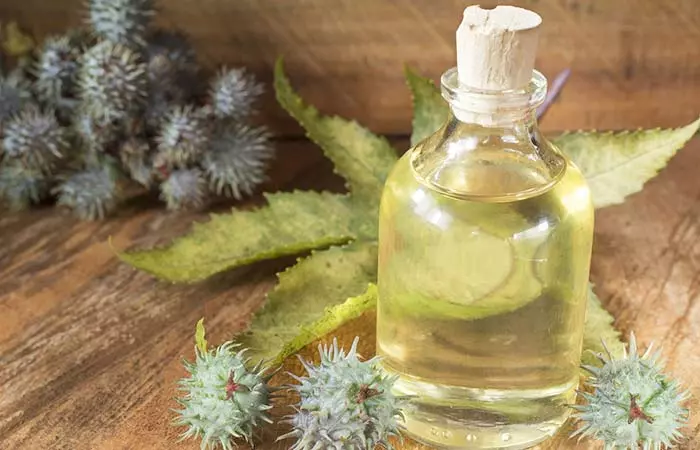
You Will Need
- 1 tablespoon of 100% organic castor oil
- 1 cup of hot water
What You Have To Do
- Mix a tablespoon of castor oil with a cup of medium hot water.
- Sip on this solution slowly.
How Often You Should Do This
You must do this once daily for a few days.
Why This Works
Castor oil can be an effective tool to lessen the population of intestinal parasites due to its strong laxativei A type of medicine or substance that loosens stools and increases bowel movements and helps relieve constipation. properties especially when bowel movements are less than twice a day. It enhances the secretion of intestinal mucus when taken with hot water, which, in turn, forces out bile along with the toxins and parasites (4).
Caution
You must only consume 100% organic castor oil.
4. Cloves
You Will Need
- 2-3 cloves
- 1 cup of water
- Honey
What You Have To Do
- Add two to three cloves to a cup of water.
- Bring it to a boil in a saucepan.
- Simmer for 5 minutes and strain.
- When the solution cools a little, add some honey to it.
- Drink immediately once it is cool enough to drink safely.
How Often You Should Do This
You must consume this solution 3 to 4 times daily for a week.
Why This Works
Clove contains a compound called eugenol, which is a strong germicidal and anthelmintic agent. Its regular intake promotes the destruction of intestinal parasites and their larvae and eggs (5).
 Quick Tip
Quick Tip5. Herbal Tea
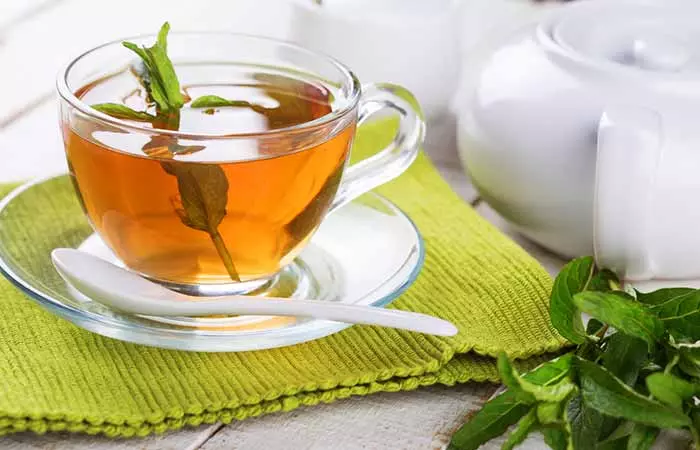
You Will Need
- 1 teaspoon of peppermint or fennel tea
- 1 cup of water
What You Have To Do
- Add a teaspoon of peppermint or fennel tea to a cup of water.
- Bring it to a boil in a saucepan.
- Simmer for 5 minutes and strain.
- Add some honey for flavor and consume before the tea turns cold.
How Often You Should Do This
You must drink this 3 to 4 times daily for at least a week.
Why This Works
Certain herbal teas (like those made from fennel and peppermint) are rich in components that speed up the destruction of intestinal parasites. They possess antiparasitic properties that flush out toxins and parasites from your system (6).
6. Turmeric
You Will Need
- 1 teaspoon of turmeric powder
- 1 glass of hot coconut milk
What You Have To Do
- Add a teaspoon of turmeric powder to a glass of hot coconut milk.
- Stir well and consume.
How Often You Should Do This
You must do this 1 to 2 times daily for a few days.
Why This Works
The presence of curcumin and berberine in turmeric imparts many benefits to it, including the ability to get rid of intestinal parasites (7). Curcumin exhibits anthelmintic and antimicrobial properties that cleanse your intestine of parasites as well as other toxins (8).
7. Papaya
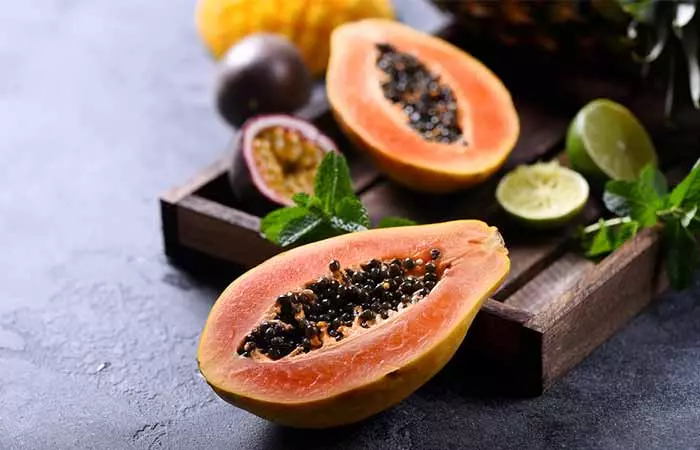
You Will Need
- 1 tablespoon of papaya seeds
- ½ cup of papaya
- 1 cup of coconut milk
What You Have To Do
- Add a tablespoon of papaya seeds, half a cup of cut papaya, and one cup of coconut milk in a blender.
- Blend well and consume the mixture.
How Often You Should Do This
You must do this once every three days.
Why This Works
Papaya seeds possess anthelmintic and anti-amoebic properties that help in expelling intestinal parasites. They enhance your digestion while also killing intestinal worms (9).
8. Ginger
You Will Need
- 1-2 inches of minced ginger
- 1 cup of water
What You Have To Do
- Add an inch or two of minced ginger to a cup of water.
- Bring it to boil in a saucepan and simmer for 5 minutes.
- Strain and let it cool a bit.
- Consume before the ginger tea runs cold.
How Often You Should Do This
You must drink this solution 3 to 4 times daily.
Why This Works
A compound called gingerol in ginger enhances your digestion and helps in eliminating and killing intestinal parasites like roundworms, blood flukes, etc. (10).
9. Olive Leaf Extract
You Will Need
180 mg of olive leaf extract supplement
What You Have To Do
Divide 180 mg of olive leaf extract supplement into three doses and consume daily.
How Often You Should Do This
You must do this on a daily basis till you notice an improvement.
Why This Works
Olive leaf extract exhibits powerful parasiticidal properties shown in studies again leishmania parasites (11).
10. Neem
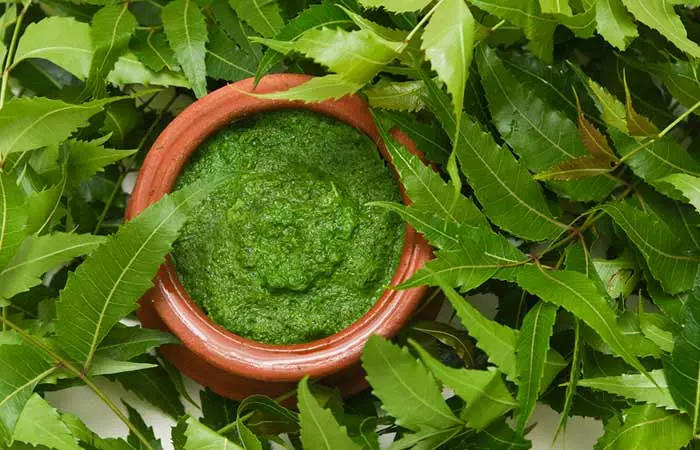
You Will Need
- 8-10 neem leaves
- Water
What You Have To Do
- Grind a few neem leaves to form a thick paste.
- Take half a tablespoon of the neem leaf paste and consume on an empty stomach with a glass of water and some honey.
How Often You Should Do This
Do this once in three weeks until you get rid of all your belly worms.
Why This Works
Neem leaves help in killing and eliminating parasites from your intestinal walls. This is mainly because of their anti-parasitic properties (12).
11. Cinnamon
You Will Need
- ½ teaspoon of cinnamon powder
- 1 glass of warm water
- Honey (optional)
What You Have To Do
- Add half a teaspoon of cinnamon powder to a glass of warm water and mix well.
- Consume this solution immediately.
How Often You Should Do This
You must do this at least three times daily for a few days.
Why This Works
Cinnamon increases the temperature within your intestine, thus making the survival of parasites difficult. It also improves your digestion and makes the excretion of parasites easier (13), (14).
12. Vitamin C
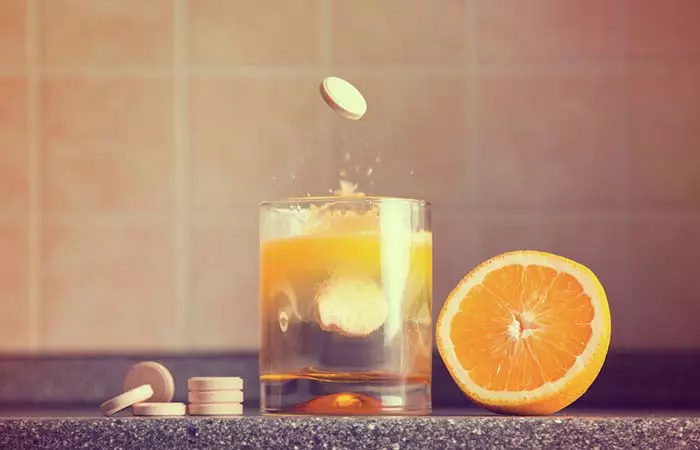
You Will Need
2000-5000 mg of vitamin C supplement
What You Have To Do
Take 2000-5000 mg of vitamin C in two to three doses.
How Often You Should Do This
Do this once daily for a few days.
Why This Works
Vitamin C is an exceptional antioxidant known for its immune boosting properties, which help kill intestinal parasites (15).
Caution
Vitamin C must not be taken with magnesium or calcium supplements.
13. Aloe Vera
You Will Need
1 glass of fresh aloe juice
What You Have To Do
Drink a glass of freshly prepared aloe juice.
How Often You Should Do This
You must drink 2 to 3 cups of aloe juice daily for effective results.
Why This Works
Aloe vera exhibits purgative effects that help in flushing out all the toxins as well as parasites from your belly. It is one of the best remedies for treating intestinal parasites (16).
14. Grape Seed Extract
You Will Need
- 8-12 drops of grape seed extract
- 1 glass of water
What You Have To Do
- Add a few drops of grape seed extract to a glass of water.
- Mix well and consume immediately.
How Often You Should Do This
You must drink this solution 1 to 2 times daily.
Why This Works
Grape seed extract contains oligomeric proanthocyanidin complexes ( OPCs). These impart antimicrobial properties to it that help in getting rid of the intestinal parasites (17).
15. Pumpkin Seeds
You Will Need
- 1 cup of raw pumpkin seeds
- ½ cup of coconut milk
- ½ cup of water
What You Have To Do
- Blend a cup of raw pumpkin seeds with half a cup each of water and coconut milk.
- Drink this mixture on an empty stomach.
- Keep yourself well hydrated throughout the day.
How Often You Should Do This
Repeat this procedure for 2 to 3 weeks for complete recovery.
Why This Works
Pumpkin seeds contain a compound called cucurbitacin that paralyzes the worms inside your stomach, thereby helping in detaching them from your intestinal walls and expelling them via stool (18). For large parasites, chewing the seeds after they are cooked will put the seeds into the digestive tract in a way that will mechanically cut at the parasites.
The above remedies can speed up the cleansing process of your intestines, thereby assisting greatly in expelling the worms within your stomach.
In addition to taking targeted remedies, a complementary healthy diet can also help with work control. Let’s learn more about these diets in the section below.
Recommended Diet
What To Eat
- Green leafy veggies
- Green onions
- Pineapples
- Fish rich in fatty acids
- Probiotic-rich foods
What To Avoid
- Sugar
- Refined carbohydrates
In addition to your diet, you must also follow a few other tips like the ones mentioned below to prevent the recurrence of parasitic infections.
Prevention Tips
- Wash your hands with soap and water before and after eating food.
- Avoid raw fish and meat.
- Wash your hands after using the loo and before cooking.
- Wash and peel fruits and vegetables before you cook/consume them.
- Disinfect all utensils that may have come in contact with raw fish or meat.
- Avoid direct contact with soil.
- Always carry a hand sanitizer while traveling.
- Drink only bottled water while you are traveling.
- Do not self-medicate on antibiotics and other medicines.
We are all at equal risk of developing intestinal parasites. So, we must take extra precautions when it comes to our day-to-day hygiene (especially while traveling).
However, if you have severe discomfort then consulting a healthcare practitioner and getting medical treatment is the best idea. Scroll down to learn when it is time to see the doctor.
When To See A Doctor
You should see a doctor if you suspect intestinal parasites and have ongoing symptoms like severe abdominal discomfort, prolonged diarrhea, unexplained weight loss, or visible worms in your stool. If you observe blood in your stool, feel extremely exhausted, or start to exhibit signs of malnutrition, including brittle nails or hair loss, you should get medical help right away.
It is especially important to consult a doctor if over-the-counter medications fail or if symptoms worsen, as untreated infections can lead to problems like bowel obstruction or organ damage. Timely medical intervention can prevent more serious health issues.
Let’s take a look at how this issue may be handled by a licensed professional in the section below.
Other Treatments For Intestinal Parasites
The doctor may prescribe specific medications to eradicate the parasites and alleviate symptoms. They may include anti-parasitic drugs, such as albendazole, mebendazole, or metronidazole, depending on the type of parasite. The course of treatment and the dosage depends on the severity of the infection and the individual’s health condition. Additionally, supportive measures like rehydration and nutritional supplements might be necessary, especially in severe cases. It is very important to maintain good hygiene, including frequent handwashing and avoiding contaminated food and water sources, to prevent reinfection. Regular follow-ups with a healthcare provider ensure proper monitoring and complete eradication of the parasites from the body. Untreated parasitic infections can lead to a variety of health complications. Let’s understand in the next section.
Complications Of Untreated Parasites
Parasites can cause significant damage to the body. They may:
- Interfere with the absorption of nutrients from the digestive system, leading to malnutrition and weight loss.
- Cause anemia by damaging red blood cells or interfering with iron absorption.
- Lead to intestinal blockage, leading to severe abdominal pain, vomiting, and constipation.
- Spread to other organs, such as the heart, liver, kidney, or lungs, causing serious health problems.
Infographic: 7 Safe Food Practices To Prevent Parasitic Infections
Parasitic worms like pinworms or hookworms can result in symptoms like weight loss, anemia, stomach aches, and skin rashes. The good news is that following a few simple home remedies can help in flushing your body of these parasites. However, prevention is better than cure. We have listed some safe food practices to reduce your risk of developing these infections. Check out the infographic below to know more! Illustration: StyleCraze Design Team
Intestinal parasites, like flatworms and roundworms, are organisms that feed on the waste products of humans and animals. Symptoms of having parasites in the intestines include fatigue, unexplained loss of weight, anemia, lack of appetite, nausea, stomach ache, and weakness. You may get these parasites by eating undercooked meat, drinking water that is contaminated, or coming into contact with contaminated objects, soil, or excreta. Tea tree oil, garlic, castor oil, turmeric, papaya, vitamin C, ginger, aloe vera, etc., are some natural ingredients that can help you get rid of intestinal parasites. Anecdotal evidence suggests that witch hazel, black walnut hull extracts, and caprylic acid may also help treat human intestinal parasites. Additionally, including a diet rich in probiotics and green leafy vegetables may also help you get rid of intestinal parasites faster.
Frequently Asked Questions
What does poop look like when you have worms?
If you are infected with intestinal worms, you might see small white thread-like structures in your stool.
How long do intestinal worms last?
Worms can live in your intestines from a few months to even decades. However, with suitable treatments and medication, you can speed up their elimination.
What teas are good for killing intestinal parasites?
Herbal teas like peppermint tea and fennel tea are a great way to expel worms from your intestines.
What kind of doctor should I see for intestinal parasites?
For intestinal worms, you can visit an infectious disease specialist or even a general physician as this medical condition is a common occurrence.
Does Epsom salt get rid of parasites?
There is a lack of scientific evidence suggesting that Epsom salt may be used to get rid of parasites.
Is there a home test for parasites?
Yes. There are many commercially available at-home stool test kits that can help detect parasites.
Can you see parasites in a colonoscopy?
Yes, colonoscopy or endoscopy can be performed to detect parasites.
Are intestinal parasites contagious?
Yes, these parasites are often passed via the oral-fecal route. A person may become ill if they consume food or drink contaminated with parasite eggs or larvae.
Can parasites make you tired?
Yes. Fatigue due to energy depletion and nutrient malabsorption is frequently observed in patients infected with intestinal parasites.
Unveil effective methods to eliminate intestinal worms, including threadworms, with advice from an expert doctor. Discover the key strategies to restore your gut health in this insightful video.
References
Articles on StyleCraze are backed by verified information from peer-reviewed and academic research papers, reputed organizations, research institutions, and medical associations to ensure accuracy and relevance. Read our editorial policy to learn more.
- Soil-transmitted helminth infections
https://www.who.int/news-room/fact-sheets/detail/soil-transmitted-helminth-infections - The Natural Remedy Bible
https://books.google.co.in/books?id=m5jf4Nbsj5QC&printsec=frontcover#v=onepage&q&f=false - Evaluation of the anthelmentic activity of garlic (Allium sativum) in mice naturally infected with Aspiculuris tetraptera
https://pubmed.ncbi.nlm.nih.gov/18673129/ - Pharmacology: Drug Actions and Reactions
https://books.google.co.in/books?id=eRCIFzkjwTgC&printsec=frontcover#v=onepage&q&f=false - The Yoga of Herbs: An Ayurvedic Guide to Herbal Medicine
https://books.google.co.in/books?id=nt1wCQAAQBAJ&printsec=frontcover#v=onepage&q&f=false - Drink to Your Health: Delicious Juices
Teas - Tree Turmeric: A Super Food and Contemporary Nutraceutical of 21st Century – A Laconic Review
https://pubmed.ncbi.nlm.nih.gov/34757887/ - Anthelmintic activity of ginger
curcumin - Effectiveness of dried Carica papaya seeds against human intestinal parasitosis: a pilot study
https://pubmed.ncbi.nlm.nih.gov/17472487/ - In vivo anthelmintic activity of ginger against gastrointestinal nematodes of sheep
https://pubmed.ncbi.nlm.nih.gov/16443342/ - Olive Leaf Extract
https://books.google.co.in/books?id=fyapVheBLikC&printsec=frontcover#v=onepage&q&f=false - Daily feeding of fresh Neem leaves (Azadirachta indica) for worm control in sheep
https://pubmed.ncbi.nlm.nih.gov/17041548/ - Medicinal properties of ‘true’ cinnamon (Cinnamomum zeylanicum): a systematic review
https://www.ncbi.nlm.nih.gov/pmc/articles/PMC3854496/ - Prescription for Dietary Wellness: Using Foods to Heal
https://books.google.co.in/books?id=Z_kueEFK0f0C&printsec=frontcover#v=onepage&q&f=false - Smart Medicine for Healthier Living: A Practical A-to-Z Reference to Natural And Conventional Treatments For Adults
https://books.google.co.in/books?id=Bh5ewBB2ie4C&printsec=frontcover#v=onepage&q&f=false - Heal without Pill
https://books.google.co.in/books?id=4FdkCgAAQBAJ&printsec=frontcover#v=onepage&q&f=false - Antimicrobial Activity Of Grape Seed Extract
https://www.researchgate.net/publication/265551129_ANTIMICROBIAL_ACTIVITY_OF_GRAPE_SEED_EXTRACT - Anthelmintic efficacy of pumpkin seed (Cucurbita pepo Linnaeus
1753) on ostrich gastrointestinal nematodes in a semiarid region of Paraíba State
Read full bio of Dr. Emily Gannaway
Read full bio of Shaheen Naser
Read full bio of Arshiya Syeda
Read full bio of Dipti Sharma






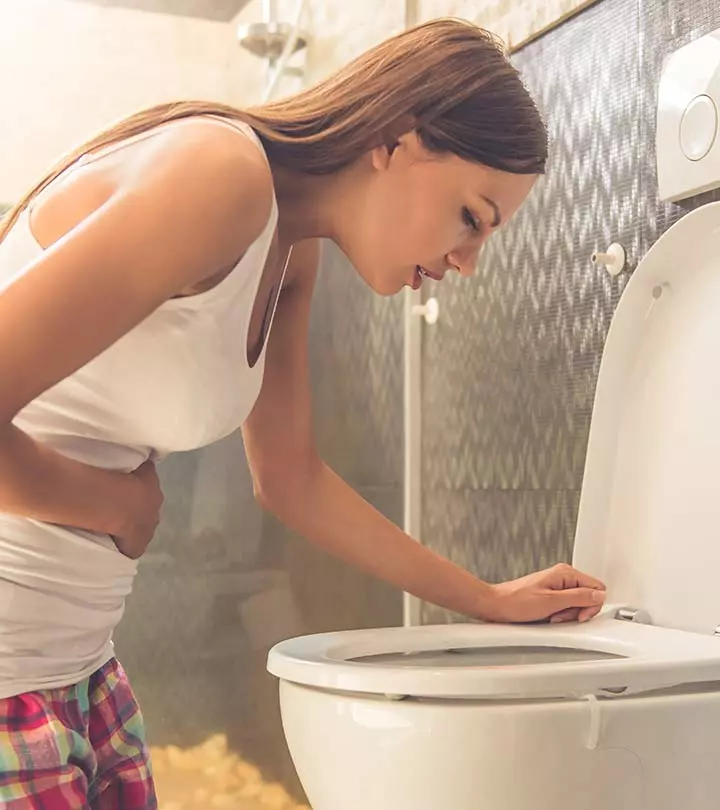
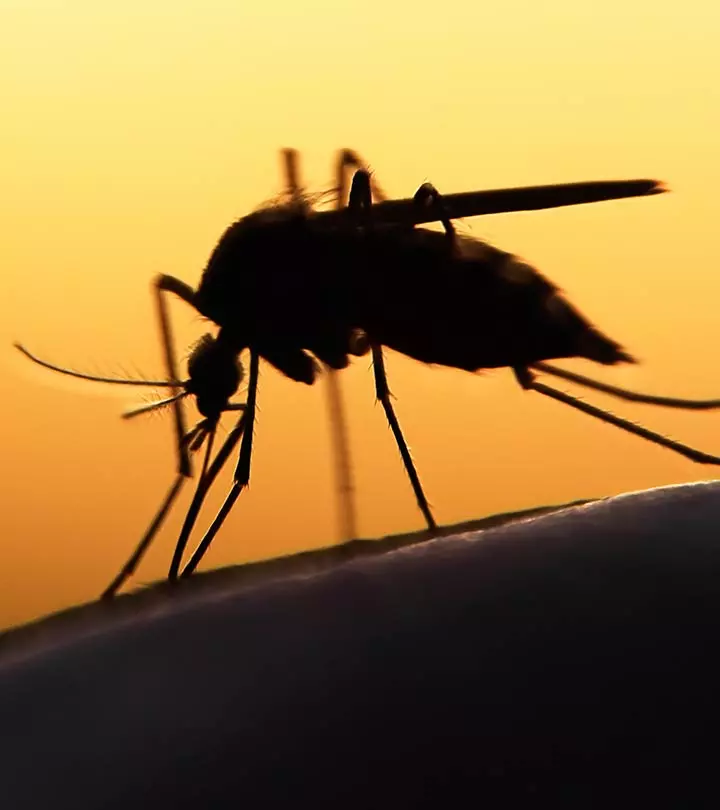
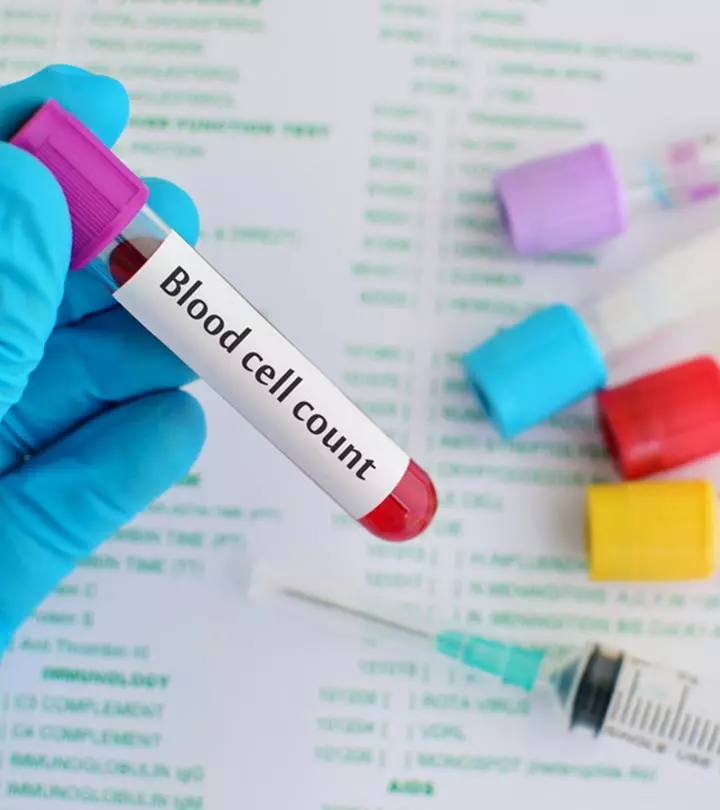
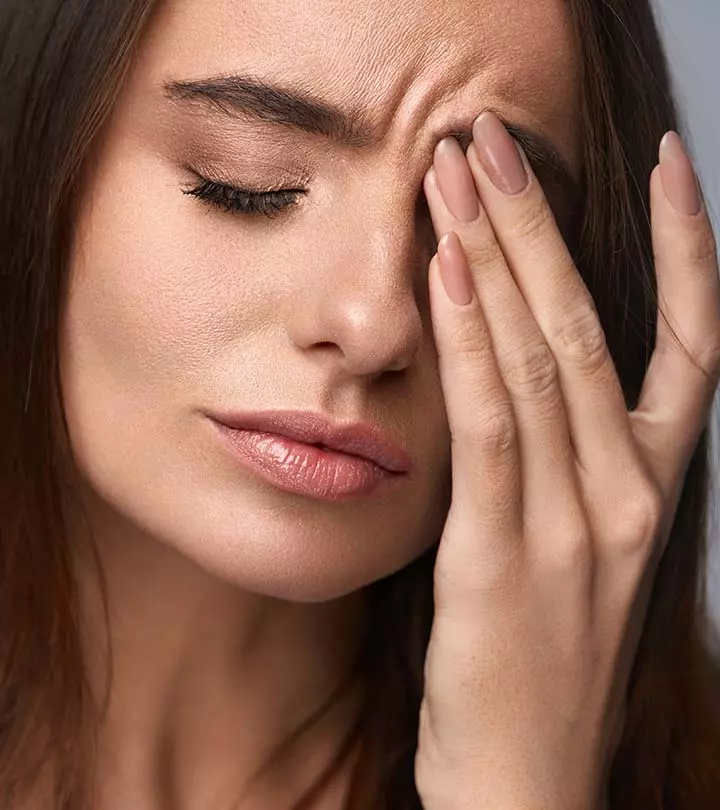
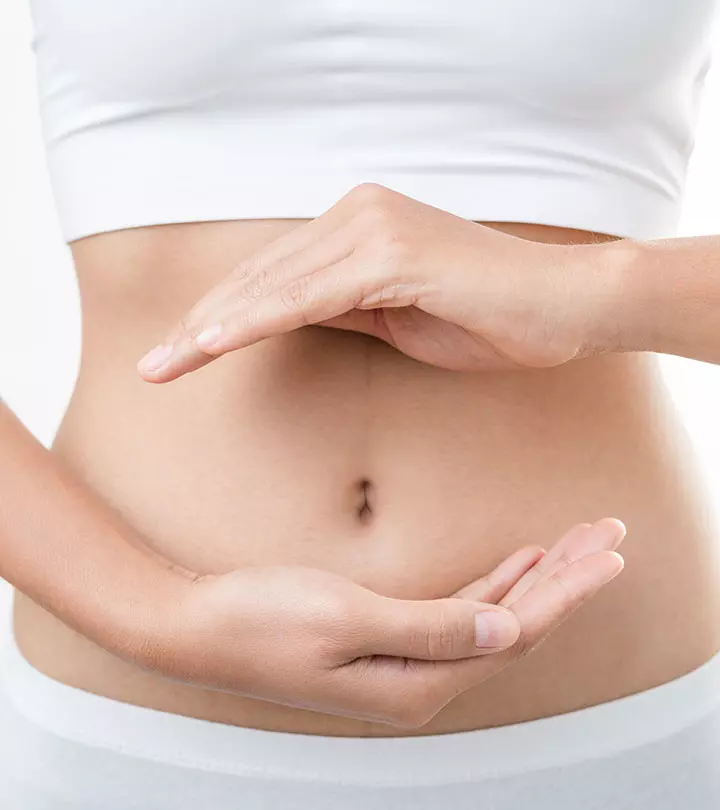

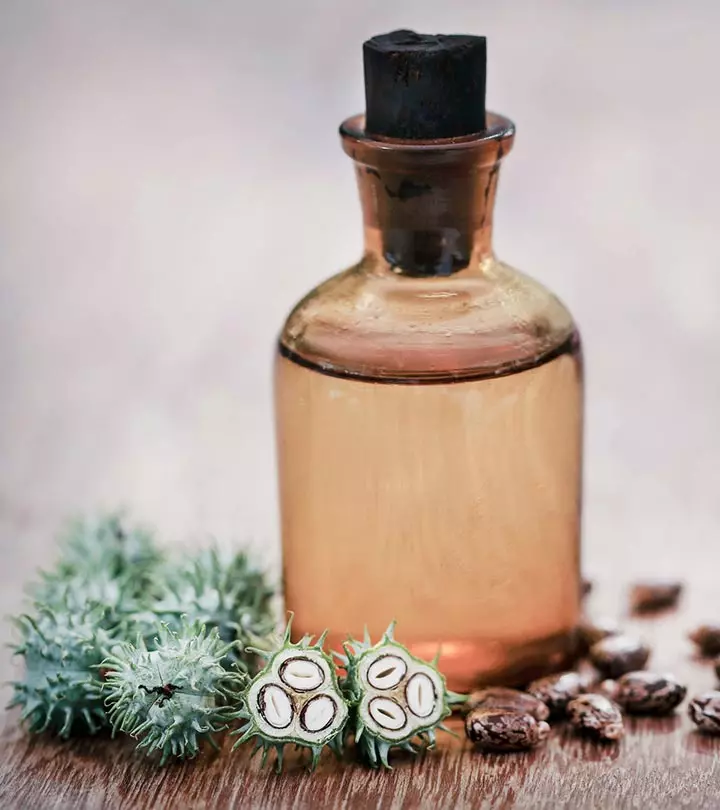
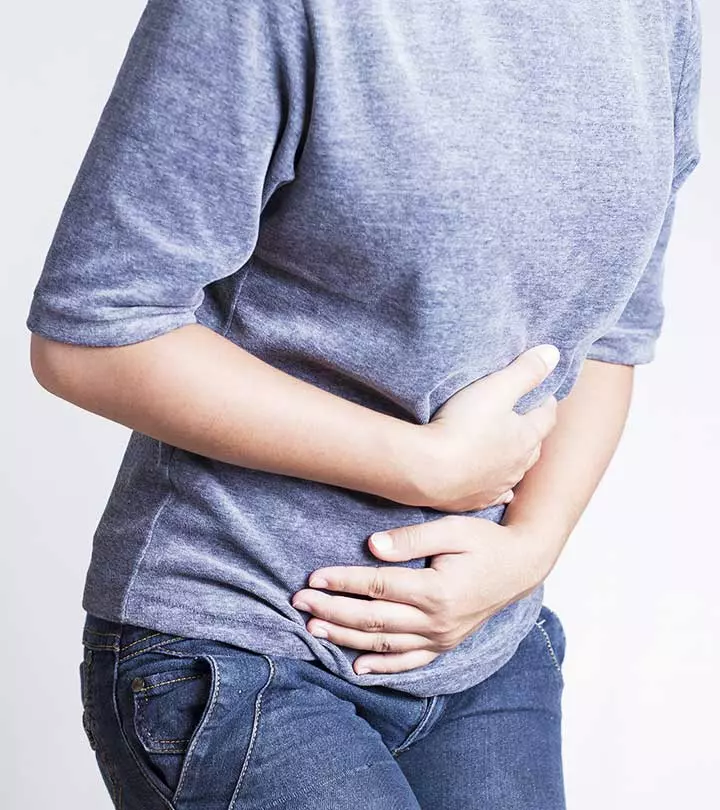
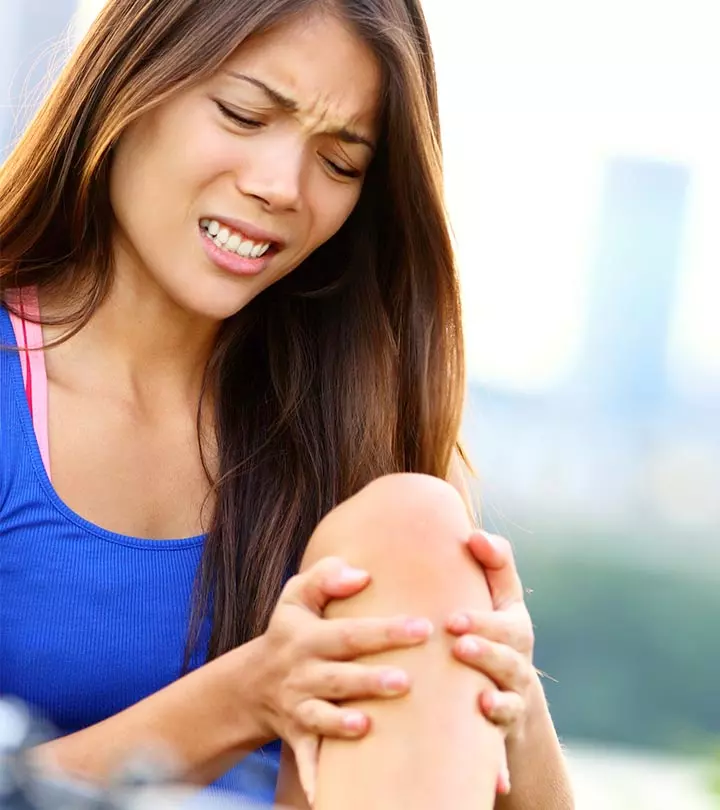








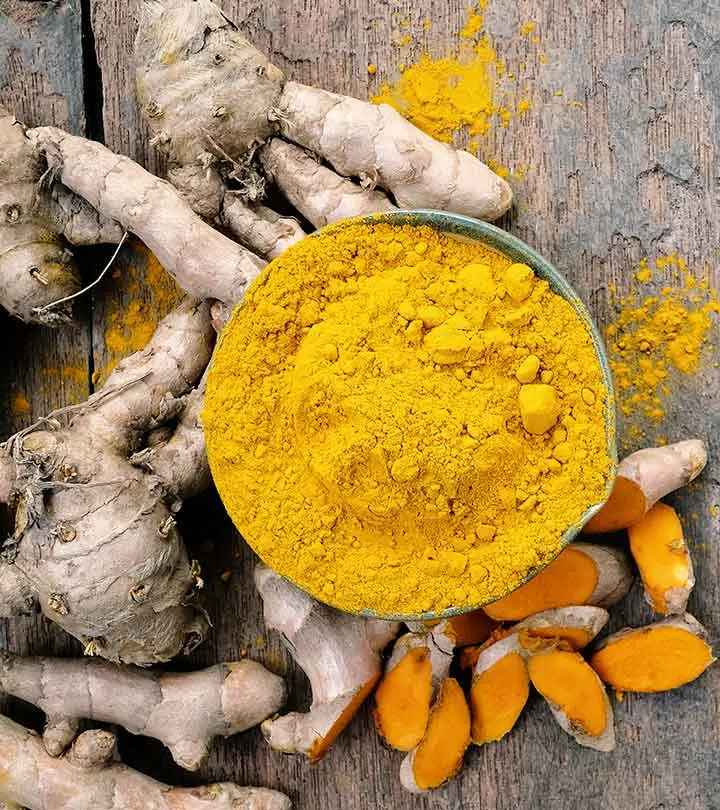

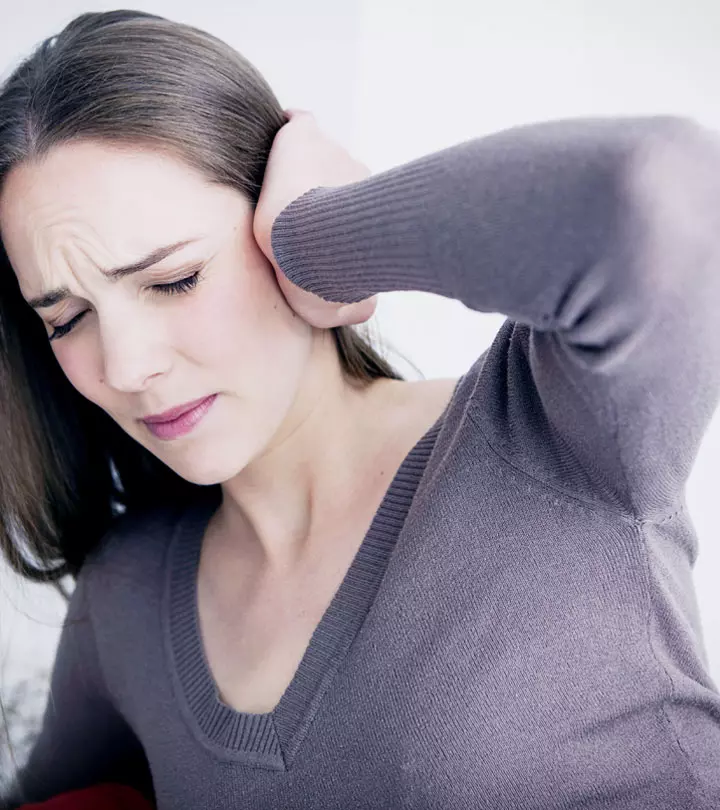
Community Experiences
Join the conversation and become a part of our empowering community! Share your stories, experiences, and insights to connect with other beauty, lifestyle, and health enthusiasts.